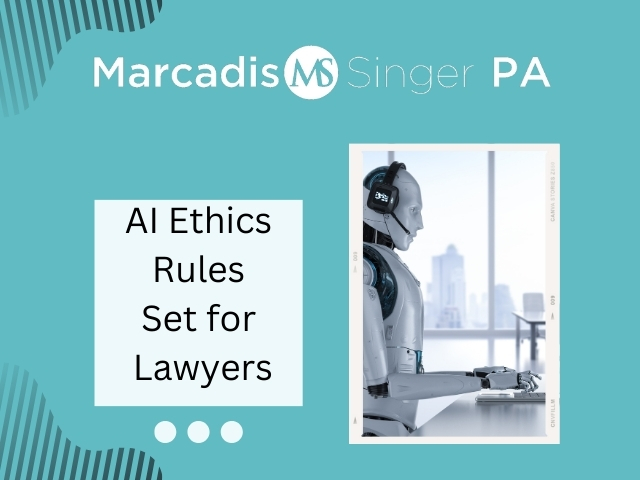The Florida Bar Board of Governors’ Review Committee on Professional Ethics has issued Proposed Advisory Opinion 24-1, which is open for comments from Florida Bar members. The opinion addresses the use of generative artificial intelligence (AI) by lawyers in their legal practice. This advisory opinion comes in response to the release of ChatGPT-3 in November 2022, which sparked discussions about the ethical implications of using generative AI in the legal profession.
Generative AI refers to deep-learning models that use data to generate probable outputs when prompted. These AI systems can create original content, analyze documents, and draft legal briefs based on written prompts. They often rely on large language models with datasets containing billions of parameters, making it challenging to trace the exact process leading to a specific result.
create original content, analyze documents, and draft legal briefs based on written prompts. They often rely on large language models with datasets containing billions of parameters, making it challenging to trace the exact process leading to a specific result.
While generative AI has the potential to enhance the efficiency of legal work, it also presents ethical concerns. Some lawyers have encountered issues with generative AI producing inaccurate or misleading information that can appear convincing. In one case, lawyers were sanctioned by a federal judge for using false citations generated by generative AI.
However, the judge’s opinion acknowledged that using reliable artificial intelligence tools for assistance is not inherently improper. To address these concerns, lawyers using generative AI must take specific precautions, including protecting client confidentiality, establishing oversight policies for AI use, ensuring reasonable fees, and complying with ethical and advertising regulations.
- Confidentiality: Lawyers must prioritize safeguarding the confidentiality of client information, as required by Rule 4-1.6 of the Rules Regulating The Florida Bar. Lawyers should obtain the client’s informed consent before using a third-party generative AI program that might involve disclosing confidential information. Rule 4-1.6(e) mandates taking reasonable steps to prevent unauthorized access to client information when using technology. Lawyers must also understand if the AI program is “self-learning,” as this may involve storing and revealing client data.
- Oversight of Generative AI: Lawyers are responsible for ensuring that generative AI systems are used in compliance with their ethical obligations. This includes verifying the accuracy of AI-generated work and taking steps to prevent ethical violations. Lawyers should not delegate tasks that require their professional judgment to AI, and they must review and oversee the work produced by AI.
- Legal Fees and Costs: Lawyers must charge reasonable fees and accurately communicate the basis for fees and costs to clients, preferably in writing. Costs must not be duplicated, and fees should not falsely inflate billable hours. Lawyers should consider adopting flat billing rates or contingent fee arrangements to prevent overcharging due to increased AI efficiency.
- Lawyer Advertising: Lawyers can advertise their use of generative AI but must avoid making misleading or unsupported claims about their AI’s superiority.
Lawyers should clearly inform prospective clients when they are communicating with an AI chatbot and ensure that the chatbot’s responses do not create false impressions. Screening questions may be used to limit chatbot interactions with clients already represented by other lawyers.
responses do not create false impressions. Screening questions may be used to limit chatbot interactions with clients already represented by other lawyers.
The Impact of Generative AI on Legal Research and Case Analysis
Generative Artificial Intelligence (AI) is revolutionizing the legal profession, not only in terms of document drafting but also in the realm of legal research and case analysis. With the advent of AI models like ChatGPT-3, lawyers now have access to powerful tools that can significantly enhance their ability to navigate complex legal landscapes.
Generative AI in legal research can quickly analyze vast amounts of case law, statutes, and regulations, providing lawyers with relevant precedents and legal interpretations. This capability can save hours of manual research and improve the quality of legal arguments. However, the use of generative AI in this context also raises important considerations.
Amidst these advancements in legal research, debt collection attorneys can leverage generative AI to streamline their workflow and identify relevant statutes and case law pertaining to debt recovery.
Benefits of Generative AI in Legal Research:
Efficiency: Generative AI can sift through extensive legal databases in a matter of seconds, allowing lawyers to find relevant cases and statutes more efficiently.
Comprehensive Analysis: These AI models can provide a comprehensive analysis of legal issues, highlighting relevant nuances that might be overlooked through manual research.
Time Savings: Lawyers can redirect their time and energy toward other critical aspects of their cases, such as client interaction and strategy development.
Ethical and Practical Considerations
While the benefits of generative AI in legal research are evident, lawyers must navigate ethical and practical considerations:
Accuracy: Ensuring the accuracy of AI-generated legal research is crucial. Lawyers should verify and cross-reference AI-generated information to minimize the risk of errors.
Cost: While AI can expedite research, it may come with associated costs. Lawyers should consider the balance between efficiency gains and the expense of using AI tools.
Ethical Responsibility: Lawyers remain ethically responsible for the advice and arguments they present to their clients and the court. Relying solely on AI-generated research without professional judgment may be seen as a breach of ethical duties.
In conclusion, generative AI is reshaping how lawyers conduct legal research and analyze cases. While it offers significant advantages in terms of efficiency and comprehensiveness, lawyers must approach its use with ethical responsibility, ensuring the accuracy of AI-generated research and maintaining transparency with clients. The integration of generative AI into legal research practices represents a significant step forward in the legal profession’s embrace of technology, but it also necessitates a commitment to ethical and professional standards.
